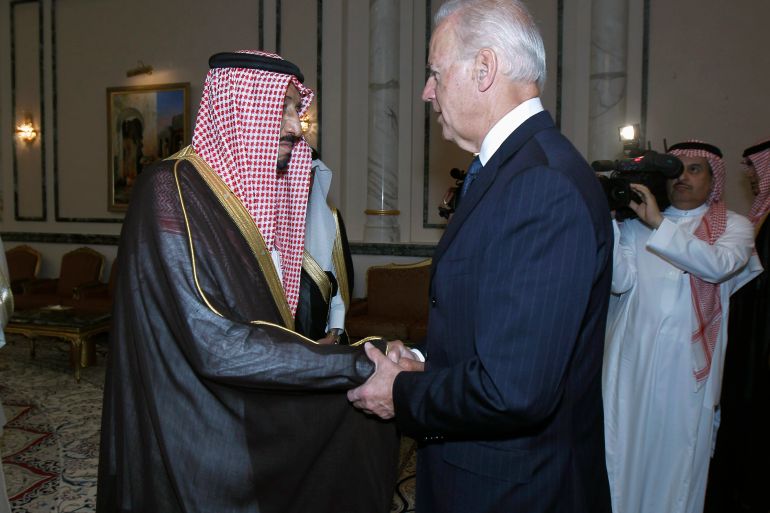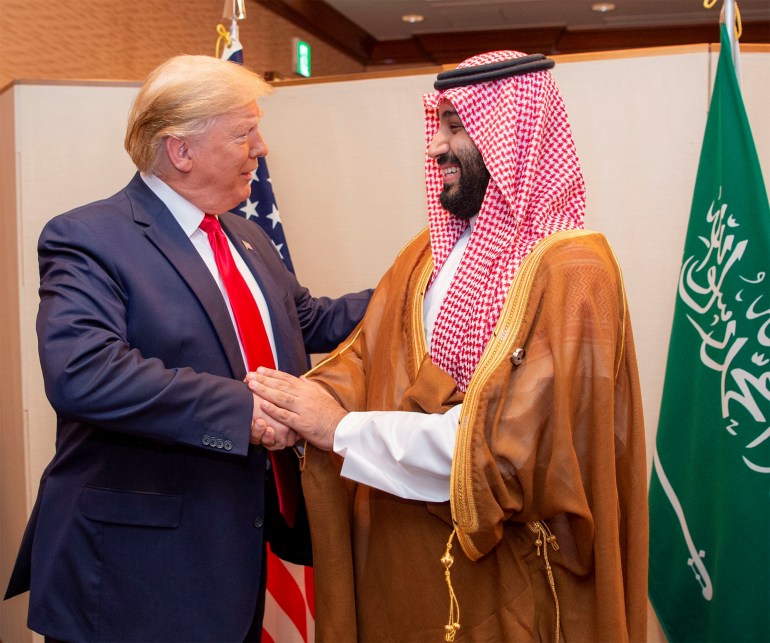Khashoggi report spurs ‘reckoning moment’ for US-Saudi relations
Newly released US intelligence report will heap added pressure on Joe Biden to reassess US-Saudi ties, experts say.

A United States intelligence report that lays blame for the killing of journalist Jamal Khashoggi at the feet of Saudi Crown Prince Mohammed bin Salman raises stark questions about the future of US-Saudi relations.
The countries have long been strategic allies, with Washington viewing Riyadh as a lynchpin in its wider Middle East strategy and as an influential ally both in the so-called “war on terror” and international fossil fuels market.
Keep reading
list of 3 itemsTwo years on, Khashoggi murder unresolved, body still missing
Biden intel chief nominee vows to release Khashoggi murder report
But the findings of the Office of the Director of National Intelligence (ODNI) report, which concluded that the Saudi crown prince approved the operation that resulted in the death of Khashoggi will heap pressure on US President Joe Biden to make good on his promise to re-assess the US-Saudi relationship.
Former President Donald Trump maintained close ties with Riyadh, and particularly MBS, the country’s de facto leader, despite Khashoggi’s assassination by a Saudi hit squad at the country’s Istanbul consulate in October 2018.
Saudi officials have denied the crown prince was involved in the killing, instead blaming rogue operatives for what happened. Asked in a 2019 interview with CBS programme 60 Minutes if he ordered the murder, MBS replied: “Absolutely not”.
He did, however, accept political responsibility, saying it “happened under my watch”.
Congress passed a defence bill in December 2019 that included a provision requiring the Office of the Director of National Intelligence to release within 30 days an unclassified report on the murder of Khashoggi.
But the Trump administration refused to release the full Khashoggi report, telling lawmakers that revealing the information would compromise the national intelligence office’s sources and methods.
Trump also personally rejected calls to rebuke MBS for the murder, including from top Republican lawmakers. He later reportedly told journalist Bob Woodward he had “saved” the crown prince from US legislators.
Yet even with the report’s release on Friday, the Biden administration and Saudi government will tread carefully, said Mahjoob Zweiri, director of the Gulf Studies Center at Qatar University, noting that neither will likely want back away too far from their tactical ties.
“But now the upper hand is with Washington,” he told Al Jazeera.
“By making that report accessible, they are saying to Saudi Arabia, ‘You need to be positive when it comes to the war in Yemen, you need to be positive when it comes to human rights, including releasing political prisoners’.”
US-Saudi relationship
Still, Andreas Krieg, a professor at the Defence Studies Department of King’s College London, said the Saudi-US relationship has been “one of the pillars of America’s Middle East policy and continues to play an important role in American power projection”.
“While Saudi Arabia will not be prioritised as much as [it was] under the Trump administration, Washington requires Saudi Arabia as a partner in the region,” he said.

Riyadh, too, will likely be unwilling to dramatically pivot away from the US and towards other possible strategic allies – notably Russia and China, said Zweiri.
Saudi Arabia has long been the largest importer of US arms and maintains several defence contracts with the US, which include maintenance and support of its sprawling defence apparatus. Shifting to a new system would take “at least two decades”, Zweiri said.
“In reality, [Riyadh] may be able to move to other countries politically – they may open up – but they will be unlikely to close the chapter.”
Pressure mounting
The US intelligence report is the first since Khashoggi’s killing to directly link MBS to the death, but it is far from the only one to implicate the crown prince.
A June 2019 report by Agnes Callamard, the United Nations special rapporteur on extrajudicial killings, determined the assassination order came from the highest levels of the Saudi government. The report also said “credible evidence” existed to justify an investigation into the “individual liability” of high-level officials and royal family members – including MBS.
Zweiri said the Biden administration will likely be monitoring domestic and international responses to the report before it decides what action to take, if any, on its findings.
The report comes amid a “groundswell of anti-Saudi sentiment within Congress”, said Steven Wright, a professor at Bin Khalifa University in Doha who focuses on US policy in the Gulf, and the implications of that “should not be underestimated in the slightest”.
Legislation proposed in the wake of Khashoggi’s killing calling for sanctions on the Saudi royal family and a broad termination of most US arms sales to the country had received bipartisan support, but was not brought to a full Senate vote during the last session of Congress. The US had previously sanctioned 17 Saudi nationals tied to the killing.
Now, more hardline action from Congress is not out the question. “It’s kind of a reckoning moment where there is potential for a shift in the relationship to take place,” Wright said.
‘A signal being sent’
Already, White House Press Secretary Jen Psaki has said Biden will only correspond with King Salman bin Abdulaziz Al Saud, and not the crown prince.
Biden had his first call as president to the 85-year-old monarch on Thursday, more than a month since taking office. The White House said he stressed the country’s “long standing partnership” while affirming “the importance the United States places on universal human rights and the rule of law”.
The Biden administration has also cut US support and arms sales related to “offensive operations” of a Saudi-led military coalition fighting in Yemen, as it increasingly pushes for a diplomatic resolution to the conflict. The US has said it will continue to offer support for Saudi defence.
The White House said Friday it would announce further action on Saudi Arabia.
While the Saudi royal family will likely feel political pressure, the report is unlikely to result in an upheaval in the Saudi line of succession, said PJ Crowley, who served as US assistant secretary of state for public affairs under former President Barack Obama.
“MBS remains likely to be a future king, and he’s going to be a king for a really long period of time,” Crowley told Al Jazeera.
“But I think there’s a signal being sent here that if he’s going to enjoy the confidence of the United States going forward, that then he has to show himself to be the kind of leader that the United States can comfortably work with.”
However, he noted the absence of larger regional threat, combined with the Biden administration’s push to re-engage diplomatically with Iran and pivot away from fossil fuels, means “the region is not as important to the United States as it once was” – and could push the US to take a harder line on human rights issues in Saudi Arabia.
“Where the United States was prepared to look the other way in the past,” Crowley said, “I think it’s less inclined to do that now.”